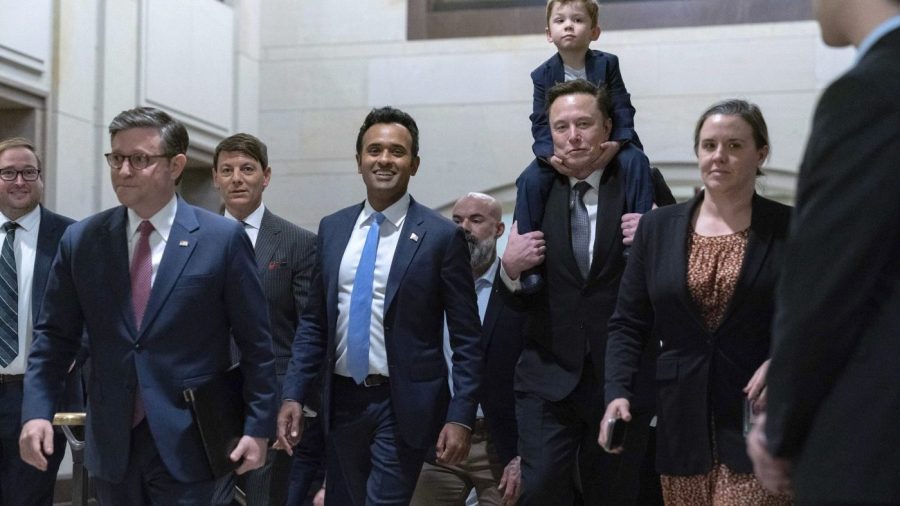
Libertarians have long espoused the virtues of a minimal state, advocating for personal liberty and economic freedom above all. But the practical application of these ideals within existing political structures has often proven elusive.
From Ronald Reagan to the Tea Party movement, Republican politicians have gained power using libertarian rhetoric, but have repeatedly failed to measurably shrink the size and scope of the state. As a professional libertarian activist for 15 years, I have at times come close to losing hope for seeing a truly limited federal government in my lifetime.
Then came the “Department of Government Efficiency” (DOGE).
One week after his victory, President-elect Donald Trump announced the establishment of a new presidential advisory commission tasked with suggesting cuts to federal spending. Spearheaded by Elon Musk and Vivek Ramaswamy, the effort is named DOGE, a double pun on the SpaceX founder’s favorite meme and the cryptocurrency named after it.
But, jokes aside, can DOGE get serious about slashing the state? My experience in Washington suggests it won’t be so simple.
The first reason to be pessimistic about DOGE is the name itself. The “Department” will not be an actual government agency, as some may believe. In fact, the commission has an expiration date of July 4, 2026. As such, its recommendations might end up as just that — suggestions. To truly scale back government spending, Trump would need cooperation from Congress, the branch with the power of the purse.
That would be a tall order considering the dirty secret that libertarians like myself do not like to acknowledge: Government spending is broadly popular. It’s true, in aggregate, that 54 percent of Americans believe that “government is doing too much,” according to an October Gallup poll. But, when you break down spending by category, Americans have a favorable view of just about every government agency (except for the Department of Education, the Department of Justice and the IRS) according to a recent Pew Research survey.
So, when the rubber meets the road, it will be difficult for DOGE to find cuts that are politically popular. Even major slashes like eliminating the Department of Education entirely — a popular call among libertarians — would trim just $82.5 billion, a fraction of the $2 trillion that Musk and Ramaswamy have pledged to cut. In fact, 55 percent of federal spending is for entitlements like Social Security and Medicare — long considered to be the “third rail” that is political suicide for Congress or the president to touch.
The final reason to be pessimistic is that the U.S. is not in a fiscal crisis — at least, not yet. We have seen throughout history that governments only accept fiscal shock therapy when the going gets really rough. The most famous contemporary example is Argentina, where President Javier Milei cut government spending by some 31 percent and closed or consolidated 13 agencies. However, Argentina has been crippled by hyperinflation caused by decades of poor governance. Things in U.S. are not quite as bleak.
Nonetheless, credit should be given to Trump, Musk and Ramaswamy for being forward-thinking enough to bring the libertarian project of slashing government spending back to the table before America becomes another Argentina. Herein lies an opportunity for libertarians. While DOGE might not directly lead to a slimmer government, it serves as a catalyst for public discourse on government efficiency and spending.
The libertarian community should view this moment as a strategic opening. Even if Trump’s policies in other areas, like tariffs, are anathema to libertarian economics, DOGE can be a rallying point for libertarians to reignite enthusiasm for fiscal conservatism. It’s a narrative opportunity in the media landscape to promote the reduction of government overreach. The memes, media coverage and public discourse can all contribute to shifting public opinion towards a more libertarian-friendly view of government.
Thus, while DOGE won’t be the silver bullet for achieving smaller government, it represents a significant cultural and political moment. Libertarians must leverage this, pushing for legislative action where possible and continuously advocating for a government that respects individual liberty.
The path to small government will not be commanded from the top but must be a collaborative effort involving a motivated populace, a responsible Congress and a president willing to champion the cause. Let this be a time when libertarians show that their ideals are not just theoretical but can indeed influence the practical workings of governance.
Casey Given is the president and executive director of Young Voices, a nonprofit public relations agency that places emerging libertarian writers in the media.

